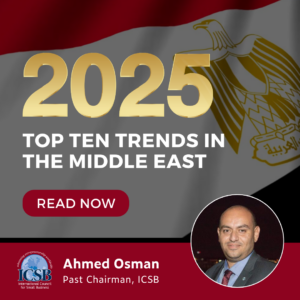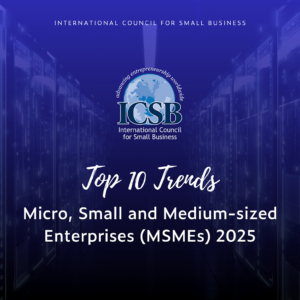
Top Ten Trends in the Middle East
Discover the dynamic shifts shaping MSMEs in the Middle East! From the rise of sustainability and ethical practices to the power
By Dr. Ayman El Tarabishy
President & CEO of the International Council for Small Business;
Deputy Chair of the George Washington University School of Business, Department of Management

10
In 2025, MSMEs face a dual challenge: combating counterfeit goods and escalating cybersecurity threats. Counterfeit products flood markets, eroding trust and undermining small businesses’ hard-earned reputations. Advanced technology allows counterfeiters to replicate products and packaging with alarming precision, making it harder for customers to identify authentic items. For MSMEs, counterfeit goods mean lost revenue and damaged customer loyalty.
Simultaneously, MSMEs are prime targets for cyberattacks, as their smaller operations often need more robust security systems for larger enterprises. Cybercriminals exploit these vulnerabilities through ransomware, phishing, and data breaches that can financially and operationally cripple businesses. Without safeguards, MSMEs risk losing critical data and eroding customer trust—a vital asset for any small business. Affordable cybersecurity measures, such as encryption, multi-factor authentication, and employee training, must become priorities to reduce these risks effectively.
To tackle these issues, MSMEs must adopt proactive strategies that blend innovation and collaboration. Investing in technologies to authenticate products and secure data is just the start. By joining industry alliances and leveraging shared knowledge, small businesses can strengthen defenses against counterfeiters and cyber criminals. Protecting integrity and innovation is critical for MSMEs to remain a driving force in economic growth and societal progress.
09
We are excited to spotlight Human-Centered Entrepreneurship, a trend gaining importance and moving closer to the mainstream. Its inclusion as the theme for the 2024 UN MSMEs Day at the ILO and the United Nations marks a significant milestone in its global recognition. In 2025, this transformative concept continues to rise in prominence, ranking Humane Entrepreneurship: Coaching and Mentoring of Employees as the #8 trend for MSMEs, following its ranking at #4 in 2023.
Human-centered entrepreneurship creates a workplace culture that values employees as the core of business success. MSMEs increasingly understand that investing in their workforce’s growth and well-being is more than a moral imperative—a strategic advantage. Coaching and mentoring programs have become practical and impactful tools for enhancing employees’ skills, unlocking their potential, and nurturing career development. This approach fosters employee loyalty and commitment while building inclusive, empathetic, and productive work environments.
This trend aligns with a broader global shift toward valuing the human aspect of business. By embracing Humane Entrepreneurship, MSMEs are fostering growth and innovation and positioning themselves for long-term success in a competitive and dynamic business landscape. As this movement continues to gain traction, its importance in shaping the future of work and enterprise cannot be overstated.
08
In 2024, Collaborative Alliances emerged as the #1 trend for MSMEs, revolutionizing how small businesses leverage unity to navigate challenges. By pooling resources, expertise, and market insights, MSMEs banded together as a collective force, negotiating better terms, accessing untapped markets, and building resilience against economic uncertainties. These alliances represented a robust response to volatile markets, transforming individual MSMEs into a united front capable of thriving in an unpredictable business environment.
In 2025, this trend has evolved and, as a result, dropped in ranking, now sitting at #9. This shift is due to its digitization through simple yet effective technologies like WhatsApp and other apps that enable MSMEs to connect effortlessly. These digital tools have streamlined collaboration, allowing MSMEs to share knowledge, form partnerships, and coordinate efforts more efficiently. As these platforms increasingly integrate with AI-powered solutions, we anticipate further transforming collaborative alliances, enhancing their impact through automation, data-driven insights, and predictive analytics.
07
Empowering women in entrepreneurship continues to be a vital yet slow-moving trend in 2025, maintaining its position on our ICSB Top Ten Trends. The Evolution of WomenPreneurs gained global attention in 2023, driven by ICSB’s emphasis on supporting women and youth in MSMEs and resilient supply chains. This theme gained momentum following Claudia Goldin’s Nobel Prize for her groundbreaking research on gender income disparities, particularly those linked to childbirth. Goldin’s recognition brought new urgency to addressing the systemic barriers women face in the labor market, aligning directly with ICSB’s mission to foster inclusivity in the entrepreneurial ecosystem.
The path forward requires a collective effort from international organizations, policymakers, and individuals to create sustainable, inclusive ecosystems where women can thrive as entrepreneurs. This includes addressing gender income disparities, investing in women-led businesses, and fostering resilient supply chains that support women’s leadership. ICSB remains committed to advancing this mission, as empowering women entrepreneurs is not just a matter of equity—it is a cornerstone for building a brighter and more inclusive global economy.
06
In 2025, Circular Economy Business Models have become more prominent, increasing one spot in the ICSB Top Ten Trends for MSMEs. This shift reflects MSMEs’ growing urgency and commitment to adopting sustainable practices and prioritizing waste reduction. As the global focus on environmental responsibility intensifies, MSMEs increasingly align their operations with circular economy principles, reimagining traditional linear supply chains and product lifecycles for a more sustainable future.
A defining feature of this trend is product design for recyclability, where MSMEs innovate to create products that can be easily disassembled and recycled, minimizing waste and environmental impact. Beyond design, many MSMEs are launching refurbishment and resale programs, extending the lifespan of products and reducing the need for new manufacturing. These efforts reduce ecological footprints and position MSMEs as le.
In 2025, the rise of Circular Economy Business Models underscores the evolving priorities of MSMEs as they respond to global sustainability challenges. This trend is not only about doing what’s right for the planet—it’s also about creating value, innovation, and leadership in the marketplace.
05
Environmental, Social, and Governance (ESG) principles were initially designed to promote sustainability, accountability, and ethical practices, but MSMEs have devolved into a burdensome compliance system. Institutions advocating ESG now impose rigid frameworks with overly detailed requirements that often overlook the unique needs of smaller businesses. Instead of fostering meaningful change, ESG has become another layer of unnecessary bureaucracy, part of the broader issues outlined in Trend #1. Business owners are forced to allocate resources to navigate complex reporting systems, hire consultants, and comply with standards irrelevant to their scale, diverting time and energy from innovation and growth.
At the heart of the problem is a misalignment of priorities. Many institutions prioritize safeguarding their relevance over enabling impactful change, creating compliance-driven systems that alienate MSMEs. These frameworks often stifle the entrepreneurial spirit of smaller enterprises, which thrive on creativity, agility, and localized solutions. The current ESG approach discourages MSMEs from engaging in sustainability efforts by focusing on bureaucratic processes instead of practical, actionable outcomes. This micromanagement reveals a fundamental misunderstanding of ESG’s purpose, turning it into a barrier rather than a tool for positive change.
To truly support MSMEs, ESG must return to its original intent: empowering businesses to pursue sustainability in ways that align with their unique contexts. This requires shifting to simplified, entrepreneurship-focused frameworks prioritizing outcomes over processes and enabling innovation.
04
MSMEs and Navigating Trade Wars first appeared on our list in 2020 and are returning to the ICSB Top Ten Trends for 2025. This trend is back, propelled by an evolving and volatile political landscape. Global trade dynamics are shifting dramatically, creating mixed opportunities and challenges for MSMEs. While some enterprises may find new markets and advantages, others risk being negatively impacted by the turbulence.
The ICSB projects that trade wars will remain a significant issue impacting MSMEs, and evidence is already visible. Major economies’ increased tariffs are disrupting global supply chains and escalating costs for small businesses dependent on international trade. These actions create ripple effects across industries, adding layers of complexity to the already challenging landscape for MSMEs.
The implications for MSMEs are profound. Businesses must navigate these trade disputes with agility, carefully adapting their strategies to mitigate risks and capitalize on emerging opportunities. This could mean rethinking supply chains, diversifying export markets, or leveraging regional trade agreements to minimize exposure to high-tariff zones.
As trade wars evolve, MSMEs must stay informed, flexible, and innovative in their approach. For those who can adapt successfully, this challenging environment may open the door to new growth opportunities while reaffirming MSMEs’ resilience and importance in the global economy.
03
In 2025, Artificial Intelligence (AI) has climbed to the No. 3 trend, reflecting its transformative impact on the global business landscape. For Micro, Small, and Medium-sized Enterprises (MSMEs), AI is no longer a distant technology; it is a vital tool for reshaping operations, decision-making, and customer engagement. From providing data-driven insights to optimizing supply chains and delivering personalized customer experiences, AI empowers MSMEs to compete globally with unprecedented efficiency.
What sets AI apart in 2025 is the growing emphasis on humanizing its application. Businesses are not just adopting AI for automation and efficiency but are focusing on creating AI systems that enhance human interaction, foster trust, and bring empathy to digital experiences. This human-centric approach to AI ensures that technology is a collaborator rather than a replacement, making it accessible and valuable to a broader audience.
Central to this transformation is the emergence of GEN AI—a generation that has grown up immersed in an AI-integrated world. These individuals are naturally fluent in AI-driven tools and possess an innate ability to leverage technology for innovation and problem-solving. Their adaptability and creativity make them indispensable contributors to industries evolving alongside AI. For MSMEs, investing in AI education and upskilling initiatives is essential to harnessing the potential of GEN AI to drive growth, competitiveness, and innovation.
As AI evolves, MSMEs have a unique opportunity to integrate AI innovatively and empathetically. By embracing AI’s humanization and leveraging the talents of GEN AI, businesses can redefine the game’s rules and shape a future where technology and humanity thrive together.
02
As we enter 2025, the urgent call for peace as a foundation for economic development and prosperity remains paramount, especially in regions affected by prolonged conflicts like Syria, Gaza, Ukraine, and others. The devastating impact of war has left communities in turmoil, economies strained, and global markets disrupted—leading to soaring natural gas prices and critical shortages of essentials like wheat. These challenges underscore the need for peace to rebuild and prosper, highlighting the vital role of MSMEs in post-conflict recovery.
The International Council for Small Business (ICSB), under the leadership of Dr. Ayman El Tarabishy, has long emphasized the critical role of MSMEs in fostering resilience and hope in war-torn regions. Since proposing the establishment of the United Nations Day for MSMEs in 2016—celebrated annually on June 27th—the ICSB has championed these enterprises as the backbone of economic reconstruction and the hallmark of peaceful, prosperous societies. As we anticipate peace in Syria, Ukraine, Gaza, and beyond, entrepreneurs are poised to lead the charge in rebuilding shattered economies and communities. The global community must rally to support these efforts, mobilizing resources and innovative solutions to aid displaced populations and rebuild fractured economies. By empowering MSMEs, we lay the groundwork for sustainable development, resilience, and a brighter, more peaceful future for all.
01
As we confront 2025, bureaucracy continues to hinder the progress of MSMEs, with digitized systems introducing more complexity instead of reducing it. Entrepreneurs are frustrated, wondering whether to blame the technology or the people running it. Adding to the irony, many of those managing these systems—“Administrators,” “CFOs,” and “Regulators”—were instrumental in building the very bureaucratic digital walls that now obstruct progress.
By design, these roles are focused on control, oversight, and compliance—tasks like monitoring, reporting, and enforcing regulations. While these functions have their place, they often prioritize maintaining order over fostering innovation or streamlining processes. Their mandate is not to create or innovate but to control, leaving little room for entrepreneurial thinking or solutions that could empower MSMEs.
ICSB calls on all governments to take decisive action to reduce bureaucracy and eliminate unnecessary red tape for MSMEs. The challenges entrepreneurs face today concern more than digitization; while digital systems promise efficiency, they often add complexity instead of reducing it. Governments must go beyond surface-level solutions and tackle the root of the problem: the excessive steps, redundant processes, and outdated functions that hinder the progress of MSMEs.
Simply stating that “going digital” will streamline operations is no longer enough. Many digital platforms replicate the same bureaucratic inefficiencies in a virtual format, leaving entrepreneurs bogged down by systems as cumbersome as their manual predecessors. What MSMEs need is not just digitization but genuine simplification. Governments must reevaluate their regulatory frameworks and remove steps that no longer serve a purpose. They must prioritize clarity and efficiency and focus on fostering innovation rather than enforcing excessive control.
The message is clear: We don’t need more control; we need more creativity. Let’s assign entrepreneurs these roles and watch how things progress. The future of business demands it.
Be part of the largest and oldest network of small businesses and entrepreneurs in the world.

Discover the dynamic shifts shaping MSMEs in the Middle East! From the rise of sustainability and ethical practices to the power

South Korea’s SMEs and startups are at a critical juncture in 2025, facing challenges from bureaucracy and market stagnation while embracing

The Top 10 Micro, Small, and Medium Enterprises Trends for 2025. The future of MSMEs is an ever-evolving tapestry of innovation,

Elevate Your Entrepreneurial Journey ICSB Leadership By Dr. Ayman El Tarabishy President & CEO of the International Council for Small Business;